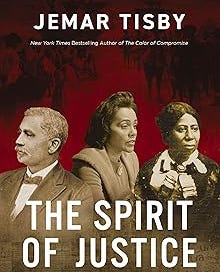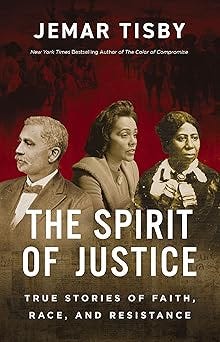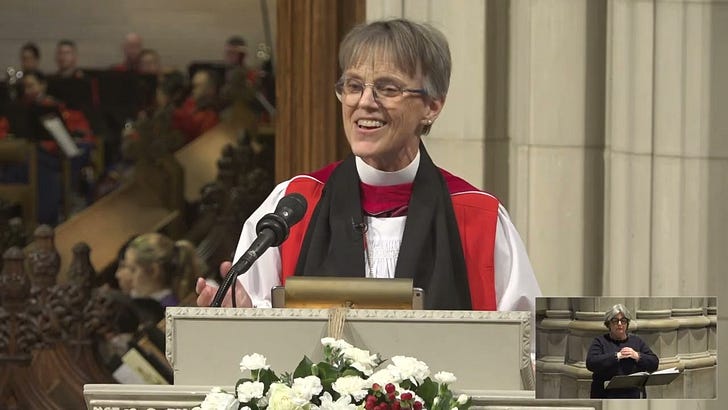
There are several excellent books about Christian nationalism that have come out in the last few months. I’ve endorsed many of them and recommended them here. They are important and timely works that illuminate what we’re up against in our current political moment.
But there’s another book that may be more important yet.
Next week, Jemar Tisby’s The Spirit of Justice releases. I’ve admired Jemar’s work since I first heard him speak, back before he published his first book, The Color of Compromise. Like that book, this book is beautifully written, clear, concise, and accessible. It would be a great book to discuss with friends, in a book group, or to read on your own. Like The Color of Compromise, it’s a work of history. So why this book, why now?
The Spirit of Justice is a book about resilience. About resisting racism, about crafting a more just society, about loving your neighbors, about acts of everyday courage. It’s a book about ordinary people who stood for what was right.
In a polarized political moment where our political future hangs in the balance, we need books that help us diagnose the problem but we also need books that inspire us to do something. We need stories of resistance, stories about courage and also about joy. Because it is joy, and a deep commitment to what is good, that carries people through weariness and empowers people to do the work, and keep doing the work.
We need to remember that we aren’t just fighting against something, we are fighting for something.
What struck me when I first heard that Jemar was working on this book was that the attacks from the Right on American history, on “DEI” and “CRT,” on telling the truth about the past, always claim that they’re trying to spare (white) Americans from negativity. They want a positive story about America, a guilt-free story of good guys prospering. But that’s all a facade. It’s only when we take an honest look at the past that we can see true goodness, too. That we can find sources of inspiration for the present. Because it’s in the darkness that we can most clearly see the light. And these stories remind us that each of us is capable of doing something—of taking risks, of standing for what is right, of living lives of integrity.
Maybe it’s not negativity but rather genuine positivity—deep goodness—that reactionaries don’t want us to encounter.
I had a chance to chat with Jemar about the book, so read on below, but before you do, a couple things to know:
There is NO BETTER WAY to support an author than to pre-order their book. By pre-ordering you send a message to the publisher and the bookstore that people want to read this book. They’ll order more. They’ll promote it more. They’ll give the book a boost that every author needs.
If you preorder the book today, you’ll have it on Tuesday and be the first to read it. Another great thing you can do for an author is take a picture of it and put it on social media with a few words encouraging others to check it out. Those little gestures make a huge difference in launching a book into the world. As a historian of religious consumer culture, I can assure you that there’s a lot of pretty bad stuff that has a lot of publicity money behind it. Our challenge is to give the good stuff a boost, giving it a chance to break through and getting it into the hands of those who most need to read it.
So, if you’re looking for a small act, a little something to do that could lead to bigger things, consider buying the book, and maybe sending one to a friend.
Here’s what you’ll be supporting:
You’ve written on the historical complicity of white Christians in our systems of inequality in The Color of Compromise, and you’ve authored handbooks on How To Fight Racism, but this book strikes a different tone. What inspired you to write The Spirit of Justice?
I was thinking about The Spirit of Justice when I was writing The Color of Compromise. I wasn’t thinking about a specific book, but as I was writing about the ways white Christians had so often failed to confront racism, I was also thinking about the other side of the story.
Black Christians formed churches, denominations, and theologies opposed to racism and white supremacy. In The Spirit of Justice, I tell the stories of the people who courageously confronted racism instead of compromising with it.
The idea for a book cemented for me when Myrlie Evers-Williams—whose husband, Medgar, was killed on the front step of their home.
She spoke at a press conference during the grand opening of the Mississippi Civil Rights Museum. After lamenting the dismal state of racial relations in the country and expressing her weariness about the continued struggle for equality, she sounded a note of defiance.
“But it’s something about the spirit of justice that raises up like a war horse. That horse that stands with its back sunk in and hears that bell—I like to say the ‘bell of freedom.’ And all of a sudden, it becomes straight, and the back becomes stiff. And you become determined all over again.”
My mind lingered on a phrase she used: the spirit of justice. And that same spirit inspired this book.
As you know better than most, American history has become a culture wars battleground, and this book dives deep into our country’s racial past. What struck me, though, is that those on the Right who want to ban “CRT,” “DEI,” and any honest look at how racism has shaped so much of our nation’s history tend to focus on negativity. They blame histories that pay attention to race as fostering “white guilt,” as destroying patriotism and positivity. Reading your book, it struck me that this is exactly wrong, and I suspect they know this. Because when you look at our nation’s racial past, stories of injustice abound but so, too, do powerful stories of resistance and resilience. These are stories of Black people and White people, of people of faith, of ordinary citizens who have acted with extraordinary courage, compassion, and resolve. Perhaps that’s what they most want to keep hidden?
Jemar: I am increasingly convinced that the critics on the Right are intellectually unserious about a fuller and accurate understanding of history. Perhaps even worse, they are incurious.
I suspect they prefer valorous mythology rather than a precise past. The stories they construct about unstoppable progress in the U.S. would shrivel in the light of a more nuanced narrative.
I will be interested to see what critics on the Right have to say about The Spirit of Justice. Their biggest complaint with The Color of Comrpomise was “What about all the good white Christians? This history is one-sided.”
My latest book includes Christians, mostly Black but some of them white, who courageously confronted racism instead of compromising with it.
I’m sure they’ll find some other aspect of the book to latch onto in an attempt to discredit me and these stories.
There are so many fascinating and utterly compelling stories in this book. Can you tell us just one of these, in brief?
Jarena Lee was the first Black woman authorized to preach in the African Methodist Episcopal (AME) denomination—the oldest continually operating historically Black fellowship in the nation.
The way she got the thumbs up from Richard Allen, first bishop of the AME, is story that deserves to be told.
Lee, born in 1783, felt a call to preach as soon after she converted to Christianity in her twenties.
She petitioned Allen to become a preacher, but the AME did not permit women to preach at that time. So, she shared her gifts by being an “exhorter” who taught in other ways outside of the pulpit.
Eight years later she got the chance to fulfill her calling. She was at church listening to a Black male preacher, Reverend Richard Williams, begin to preach. The preacher couldn’t get through his sermon. “He seemed to have lost the spirit,” Lee recalled.
Lee sensed her opportunity.
“In the same instant, I sprang, as by altogether supernatural impulse, to my feet, when I was aided from above to give an exhortation on the very text which my brother Williams had taken.”
Bishop Allen was in the congregation that day. So powerful was Lee’s preaching that he stood up afterward and explained to those assembled that “he now as much believed that [Lee] was called to that work, as any of the preachers present.”
Through this spontaneous act of exposition and courage, Jarena Lee followed the leading of the spirit of justice and became the first Black female preacher in the AME.
Why do you want people to read this, and what do you most what people to take away from this book?
We are in a precarious time.
Our nation stands on the precipice of an authoritarian, white Christian nationalist government of the few or a participatory, muliracial democracy for the many.
The choices we make now will determine the direction of our country for decades to come.
It is time for a people to rise up and resist the forces of racism and injustice in our land.
The same spirit of justice that empowered generations past is available to you today. It has been there for people across time whenever they needed it. It is here when you need it too.
The spirit of justice still speaks. Will you answer the call?















I don’t know if I can post a picture in a comment but I really want to show you all what you did—the book is now the #1 bestseller in Christian Church History on Amazon, a huge boost going into next week. Thank you!! 🙌
Am on the reviewers list, but a week behind due to COVID.